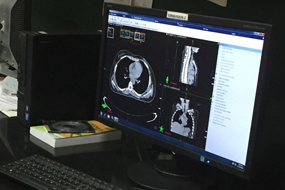Dr. Sandeep Kumar Tula is one of the best Consultant Radiation Oncologists with immense knowledge and experience in treating all types of cancer radiation issues with utmost proficiency. He has keen interest and expertise in the management of SRS, SBRT, SRT, Gynaecological malignancies, Head and neck malignancies.
M.D. Radiation Oncology from Post Graduate Institute of Medical Education And Research (PGIMER)
IMRT, IGRT, RapidArc Therapy and 3D CRT
SRS, SBRT, SRT, Gynaecological malignancies, Head and neck malignancies, Brain Tumors, Genitourinary malignancies and Lung cancers
10:00 AM - 5:00 PM At Yashoda Hospital Secunderabad
The lining of the bladder is constantly in contact with carcinogens that enter the bloodstream and get filtered through the kidneys.
Know MoreBlood is made of an almost equal mix of plasma (the liquid that transports cells, waste and nutrients, among other things) and blood cells.
Know MoreWhen these abnormal cells divide uncontrollably and then gang up together, a tumor forms. A tumor in the brain can be benign.
Know MoreCancer results when the cells in the body get divides and multiply in an uncontrolled way. This is because of the mutations of the genes.
Know MoreCounseling is working with a mental health professional to cope with the challenges that come with a cancer diagnosis. Counseling can help you.
Know MoreCervical cancer was once a leading cause of death among American women. That has changed since screening tests became widely available.
Know MoreCervical cancer was once a leading cause of death among American women. That has changed since screening tests became widely available.
Know MoreGynaecological cancer’ refers to the five cancers that start in a woman’s reproductive system - click on the links for information about each type.
Know MoreThat's why the majority of cases of head and neck cancer are called squamous cell carcinomas. Cancer of the lip, mouth and larynx are examples of squamous cell carcinomas.
Know MoreThe kidneys are two bean-shaped organs that are responsible for filtering waste from the body. They also stimulate the production of the body’s red blood cells and regulate blood pressure.
Know MoreMyeloma occurs when an abnormal plasma cell develops in the bone marrow and reproduces itself very quickly. The rapid reproduction of malignant, or cancerous, myeloma cells eventually .
Know MoreOral cavity cancer starts in the mouth. It might also be called oral cancer. Oropharyngeal cancer starts in the middle part of the throat just behind the oral cavity that can be seen when the mouth is open.
Know MoreLiver cancer is cancer that occurs in the liver. The liver is the largest glandular organ in the body and performs various critical functions to keep the body free of toxins.
Know MoreCancer results when the cells in the body get divides and multiply in an uncontrolled way. This is because of the mutations of the genes which regulate cell growth.
Know MoreThe pancreas also produces two important hormones. These hormones are responsible for controlling glucose (sugar) metabolism.
Know MoreThe prostate is actually a small gland in the lower abdomen of the body. It surrounds the urethra and located under the bladder. It is regulated by the testosterone hormone.
Know MoreThe thyroid gland is a part of the endocrine system. The endocrine system produces hormones that regulate the normal functions of the body.
Know MoreStomach cancer is characterized by a growth of cancerous cells within the lining of the stomach. Also called gastric cancer, this type.
Know MoreThe uterus is a hollow organ in females located in the pelvis, commonly called the womb. The uterus functions to support fetal development.
Know MoreWhile receiving treatment, a lot of cancer patients experience gastrointestinal symptoms as they may find meeting their nutrition needs challenging.
Know MoreHe urges people especially youngsters to lead a healthy life which includes eating a balanced diet and undertaking physical activities. Not to forget abstaining from tobacco and alcohol consumption. No doubt, Dr. Sandeep Kumar Tula selfless commitment towards his patients and society makes him the good oncologist in Hyderabd, India.
Radiation therapy, or radiotherapy, is the use of various forms of radiation to safely and effectively treat cancer and other diseases. Radiation oncologists may use radiation to cure cancer, to control the growth of the cancer or to relieve symptoms, such as pain. Radiation therapy works by damaging cells. Normal cells are able to repair themselves, whereas cancer cells cannot. New techniques also allow doctors to better target the radiation to protect healthy cells.
Once the diagnosis has been made, you will probably talk with your primary care physician along with several cancer specialists, such as a medical oncologist and a radiation oncologist, to discuss your treatment choices. These specialists will work together to help recommend the best treatment for you. In some cases, your cancer will need to be treated by using more than one type of treatment. For example, if you have breast cancer, you might have to remove the tumor, then have radiation therapy to destroy any remaining cancer cells in or near your breast (by a radiation oncologist). You also might receive chemotherapy (by a medical oncologist) to destroy cancer cells that have traveled to other parts of the body.
Radiation therapy is usually well tolerated and many patients are able to continue their normal routines. However, some patients may eventually develop painful side effects. Be sure to talk to a member of your radiation oncology treatment team about any problems or discomfort you may have. Many of the side effects of radiation therapy are only in the area being treated. For example, a breast cancer patient may notice skin irritation, like a mild to moderate sunburn, while a patient with cancer in the mouth may have soreness when swallowing. Some patients who are having their midsection treated may report feeling sick to their stomach. These side effects are usually temporary and can be treated by your doctor or other members of the treatment team.

Intensity-modulated radiotherapy (IMRT) uses linear accelerators to safely and painlessly deliver precise radiation doses to a tumor while minimizing the dose to.
Know More
Image-guided radiation therapy (IGRT) is the use of imaging during radiation therapy to improve the precision and accuracy of treatment delivery. IGRT is used to treat tumors.
Know More
Stereotactic Body Radiation Therapy (SBRT) is a treatment procedure similar to central nervous system (CNS) stereotactic radiosurgery, except that it deals with tumors outside of the CNS.
Know More
Stereotactic radiosurgery (SRS) is a non-surgical radiation therapy used to treat functional abnormalities and small tumors of the brain. It can deliver ...
Know More
RapidArc is an advanced technology we use in our Trilogyâ„¢ system to deliver intensity modulated radiation therapy (IMRT) with speed and
Know More
